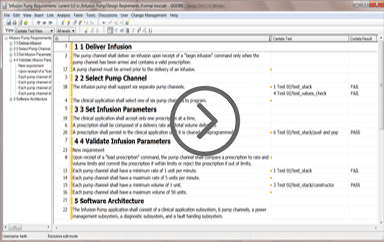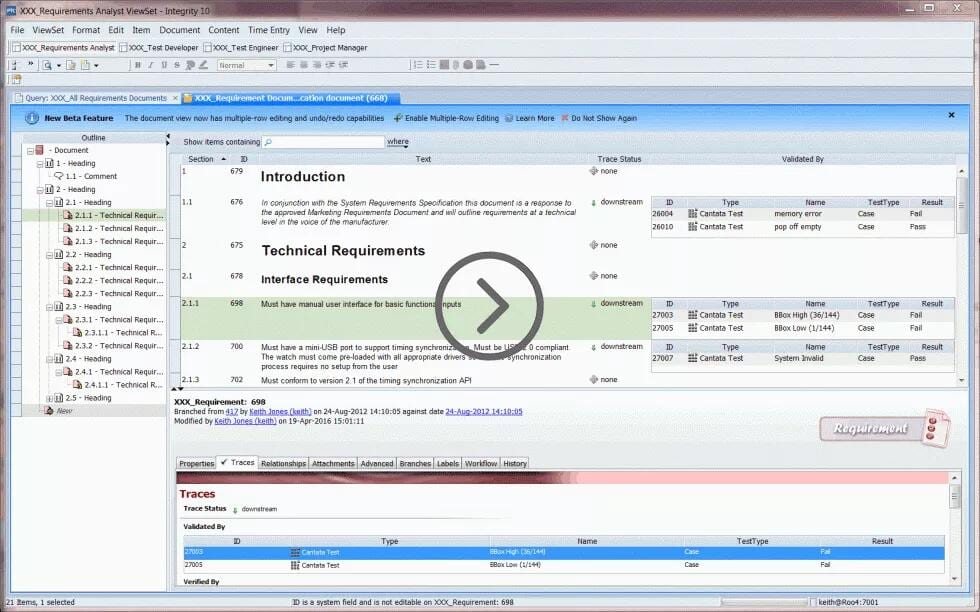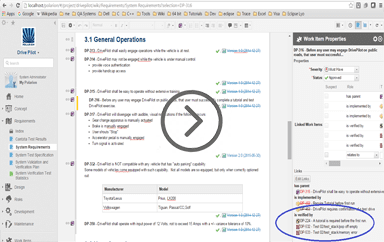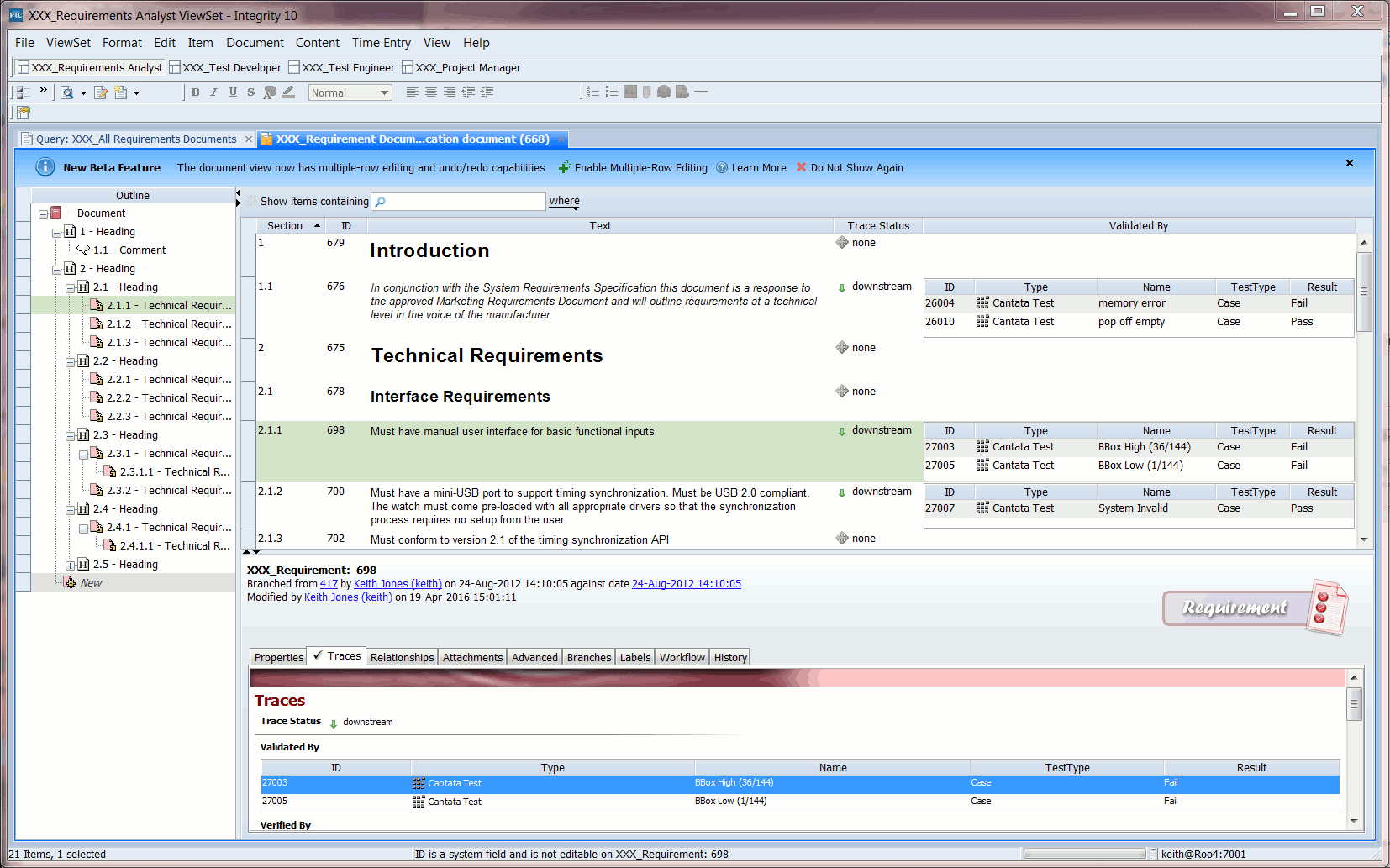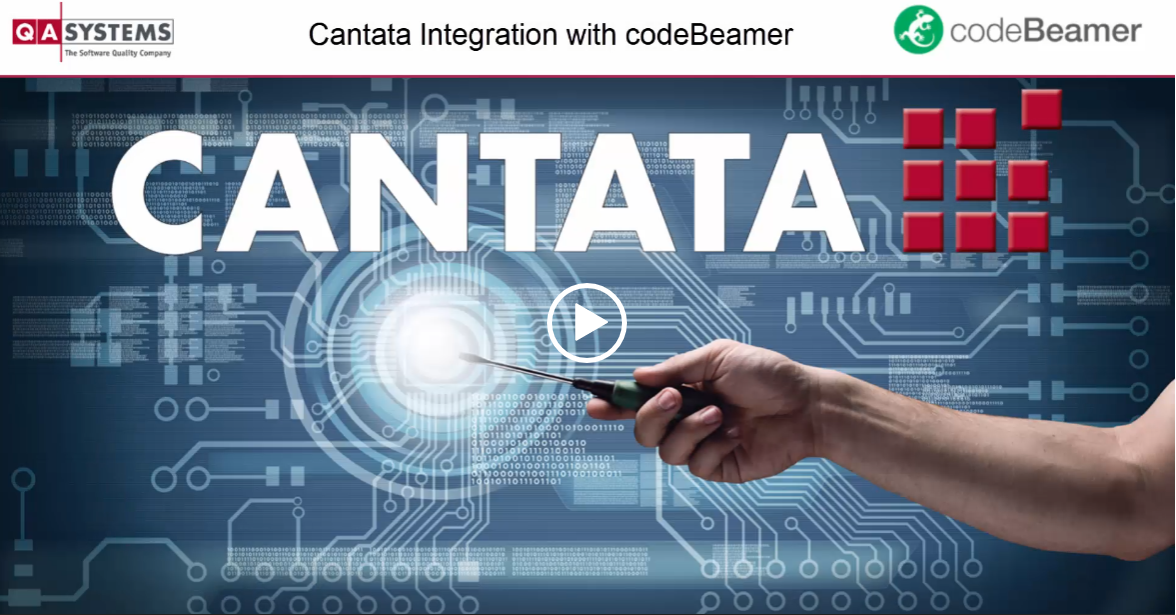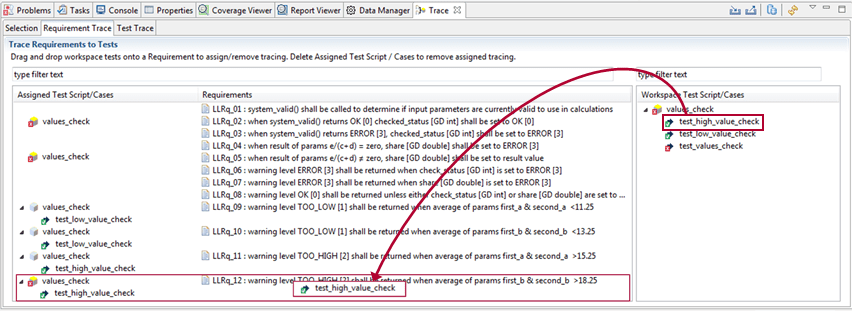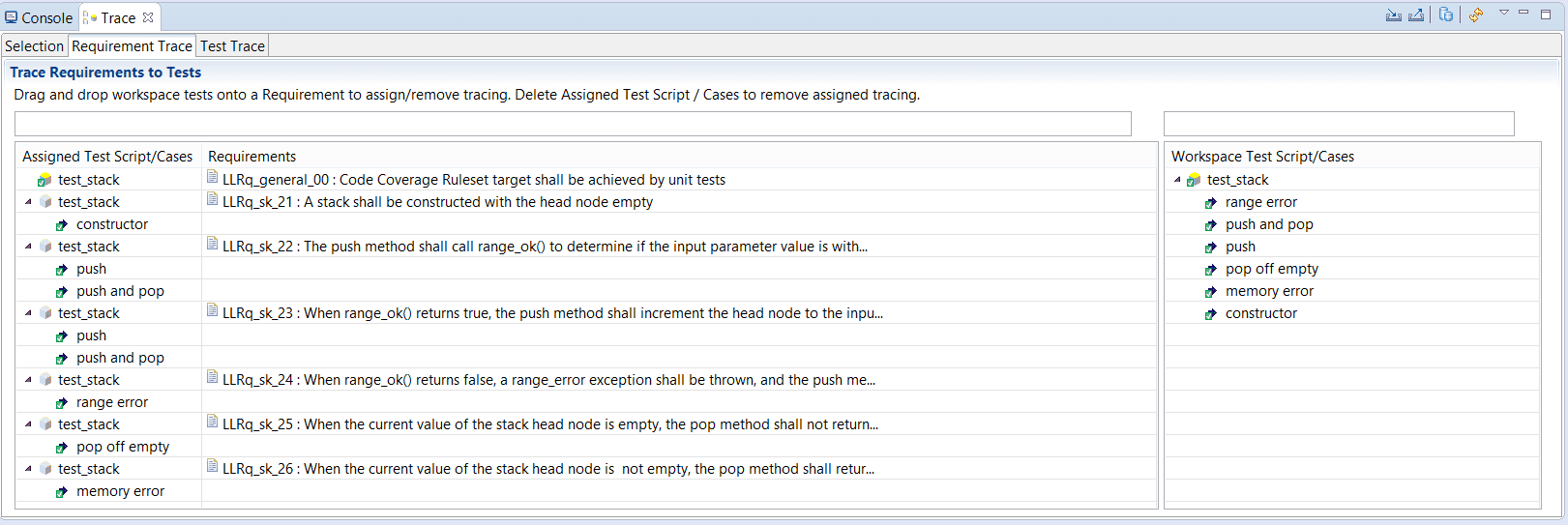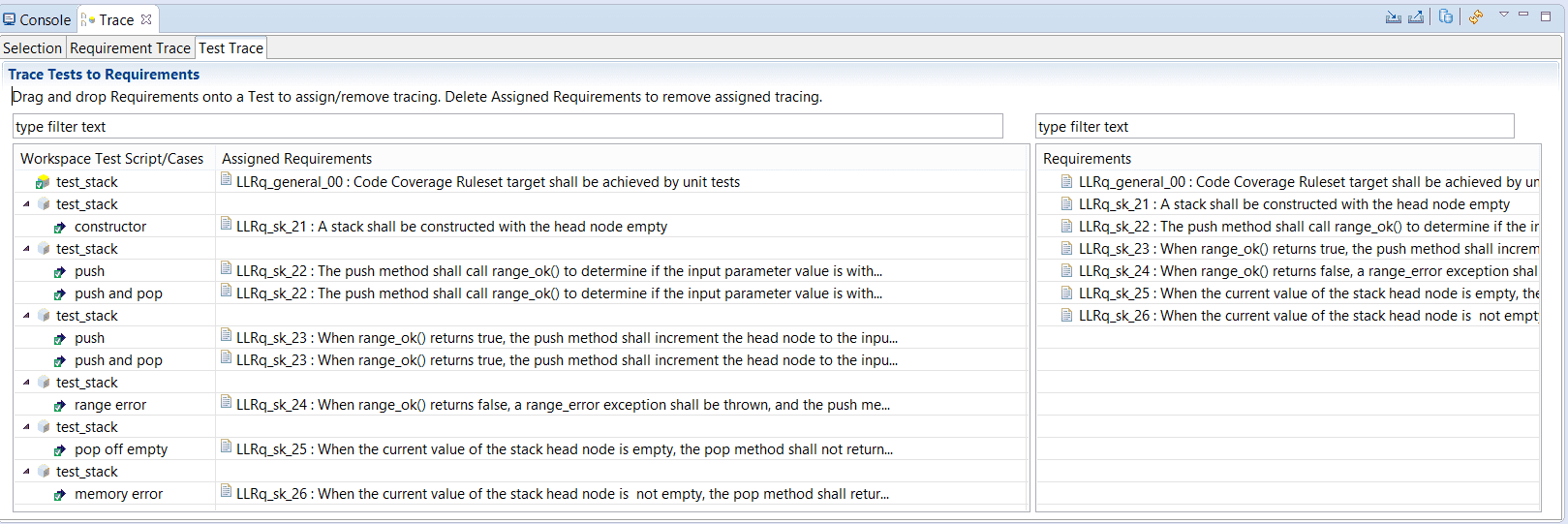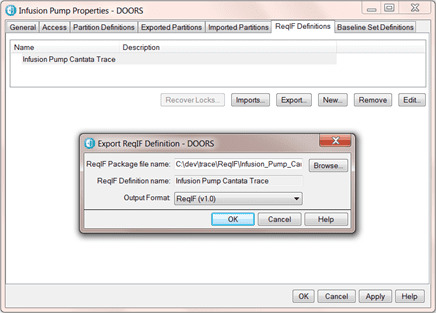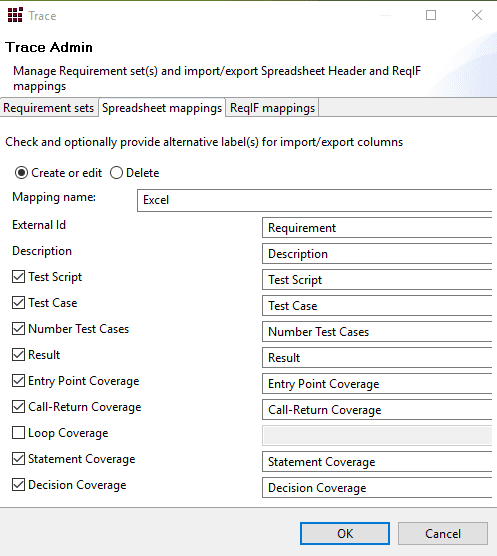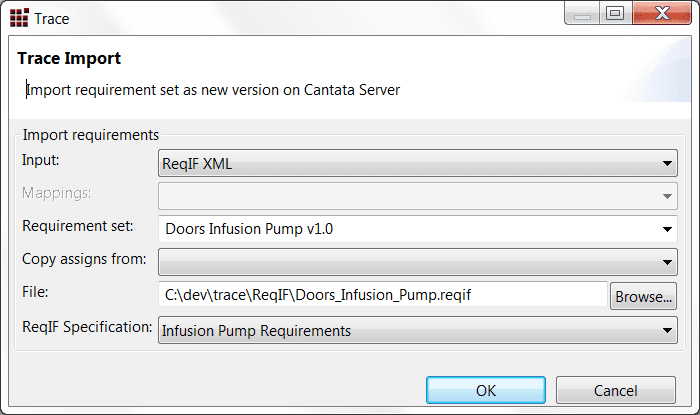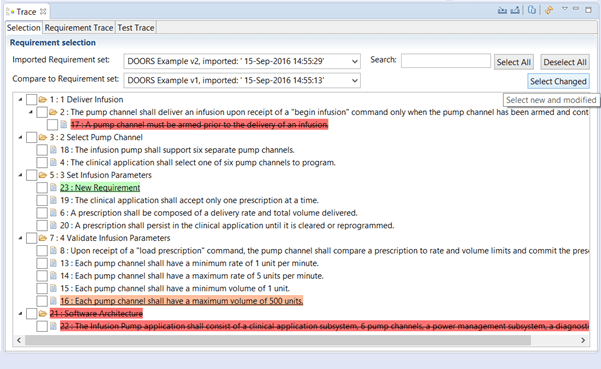What is Cantata Requirements Traceability?
Cantata offers complete bi-directional traceability relationships between the user’s requirements or test plans and Cantata test scripts and test cases, meeting the requirements traceability standards for software safety.
Requirements traceability applies to more than just Cantata unit and integration tests in software development. That’s why Cantata provides additional value to the existing traceability mechanism and doesn’t replace it. Cantata Trace automation simplifies the following tasks:
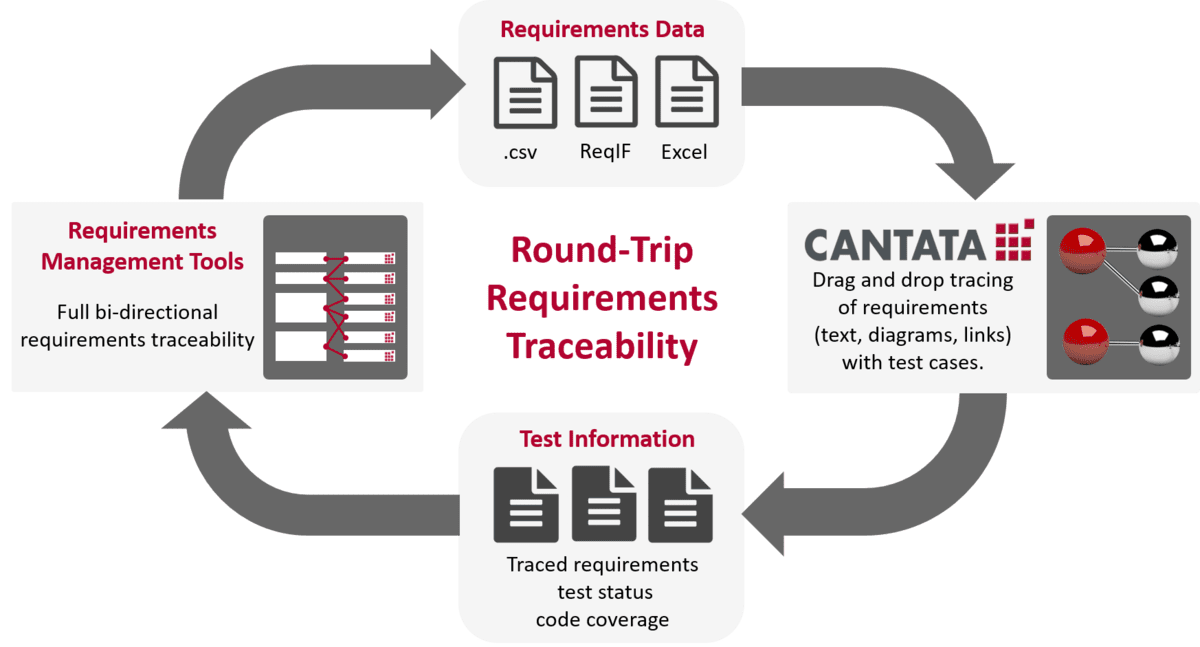
Cantata Trace imports sets of requirements or test plans from popular requirements management tools directly into Cantata. With an intuitive drag-and-drop interface, it’s easy to assign bi-directional trace relationships between requirements and test scripts and/or test cases. All traced information is stored on a central Cantata server. The requirements traceability associations are then exported back to the requirements management tool along with the status of each test and code coverage results.
Which Requirements Tools does Cantata integrate with?
Cantata can be seamlessly integrated with any tool that uses a CSV or ReqIF 1.x (Requirements Interchange Format) interface, enabling efficient requirements traceability.
Cantata Trace has already been integrated with popular tools that are commonly used for requirements management and traceability. If you have requirements that are in text documents such as Microsoft Word®, you can easily perform traceability using Microsoft Excel® or export them in the ReqIF format. If your preferred tool is not yet integrated with Cantata Trace, please feel free to contact us and we’ll arrange an integration to improve your requirements traceability process.
What does Cantata Trace help me to do?
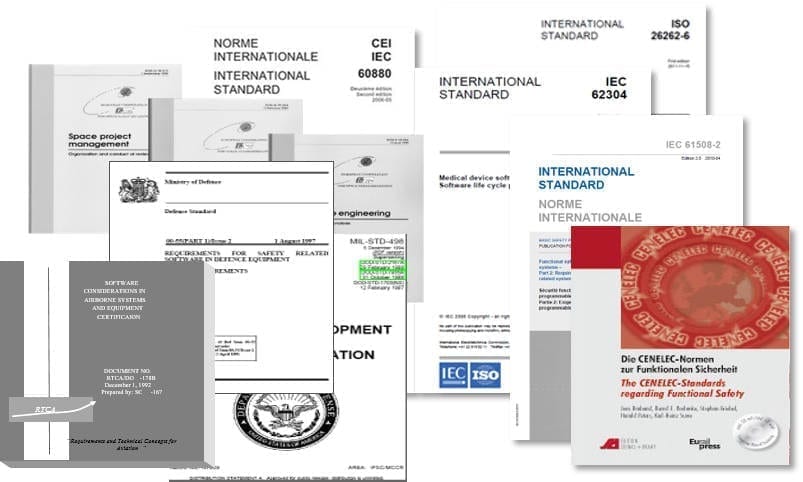
ENSURE COMPLIANCE WITH REQUIREMENTS TRACEABILITY STANDARDS
To demonstrate requirements coverage, bi-directional traceability is a crucial aspect of software safety related standards. It is essential to show that all requirements have corresponding passing tests for the implemented code. In addition, having traceability information helps in managing regression tests.
Cantata Trace facilitates the import of requirements or test plans and offers a convenient drag-and-drop linking with Cantata tests. It also exports back the links, execution pass/fail status of each test, and levels of code coverage achieved by a script. With Cantata Trace, you can easily ensure a fully compliant bi-directional requirements traceability process that integrates seamlessly with your existing tools.
EASY-TO-USE REQUIREMENTS TRACEABILITY FOR TESTING
Cantata Trace offers a user-friendly solution for requirements traceability in testing. By importing requirements directly into the Cantata Eclipse IDE, you can view them alongside tests without the need to refer to external documents or other tools.
Selected requirements and test plans are presented in a table list for trace association, with each requirement’s unique ID, text, images, and links available in a built-in HTML view.
As test cases are implemented, you can easily trace (i.e. associate) them with the requirements they verify using bi-directional views, by simply drag-and-drop. With Cantata Trace, you can streamline your testing process by ensuring complete requirements traceability.
FASTER REQUIREMENTS TRACEABILITY FOR EXISTING TESTS
Cantata Trace can be used to assign requirements or test plans to existing Cantata test scripts and test cases, making it faster to generate requirements traceability data and verify that existing tests fully verify all the requirements.
Existing tests to which traceability can be added include:
Existing tests can be traced (i.e. associated with requirements or test plans) by using drag-and-drop in bi-directional views.
EASY ROUND-TRIP SYNCHRONIZATION WITH REQUIREMENTS MANAGEMENT TOOLS
To ensure requirements traceability, Cantata Trace offers easy importing and exporting of data using CSV UTF 8, Microsoft Excel®, or ReqIF XML files for round-trip synchronization of requirements with tests.
Cantata Trace provides spreadsheet header mappings for External ID, Descriptions, and various exported results for CSV and Excel. For ReqIF data interchange, setting up the ReqIF interface in the requirements management tool is a one-time process.
Synchronization can be performed from the Cantata Trace UI or scripted using the Cantata server Trace REST API for automation with continuous integration builds, ensuring that requirements traceability is maintained throughout the development process.
How does Cantata Trace work?
MANAGING REQUIREMENTS IMPORT
Cantata Trace is a tool that can import requirements (or test plan information) directly from popular requirements management tools, optimising the requirements traceability process. Sets of requirement data, including unique ID, requirement text, images, and links, are imported in CSV UTF-8, Microsoft Excel®, or ReqIF formats from the requirement management tool. The data is stored as a non-editable copy on a Cantata server database, ensuring that the original data remains unchanged and is traceable back to its source.
A Requirement Set can be all or a subset of the requirements, named appropriately on import, and users can further filter a set for their own work. Within a data file to be imported, specific Excel Workbook or ReqIF Specifications can also be selected. This feature allows users to import only the relevant data they require for their project, reducing the possibility of errors and improving the traceability of requirements.
The mapping of ID and Description fields for display in Cantata Trace, plus other data for round trip alignment when exporting, can be set up as ReqIF XML specifications or spreadsheet header mappings. This feature enables users to configure how they want the data to be displayed, ensuring that it is easy to read and understand. Additionally, the feature helps to maintain consistency and traceability in the data, facilitating the requirements traceability process.
Overall, Cantata Trace offers a powerful solution for managing requirements import and traceability, reducing the risk of errors and enhancing productivity.
MANAGING CHANGES TO REQUIREMENTS
Whenever a set of requirements is imported, a date stamp is assigned to it to ensure requirements traceability. When changes or additions to the requirements are made in the requirements management tool, the updated requirements can simply be re-imported into Cantata to maintain requirements traceability. A “Copy Assigns” function retains any existing Cantata associations from a previously imported set, ensuring requirements traceability throughout the project.
When trace associations are assigned between requirements and tests, these relationships are automatically stored on the Cantata server, ensuring seamless requirements traceability. Engineers can see in real-time all traced associations between the latest requirements and tests, providing complete requirements traceability throughout the project lifecycle.
Cantata Trace provides color-coded visibility of changed requirements since the last time a set of requirements was imported, improving requirements traceability. This feature allows selecting only changed requirements that have changed, making it easy to focus on tracing just the updated requirements and ensuring requirements traceability is maintained.
MANAGING REQUIREMENTS TRACEABILITY EXPORT
Requirements traceability can be managed through Cantata Trace’s export feature, which is controlled by the Trace Admin functions. The same file formats used for importing are also supported for exporting, and users can configure which information should be exported along with the relevant coverage options.
Cantata Trace allows the export of requirements, including their ID and description, traced links between requirements or test plans, and Cantata test scripts/test cases. In addition, the execution pass/fail status of each test and the levels of code coverage obtained by a test script can also be exported.
Cantata Trace data can be exported on-demand using the GUI or as an automated script export via the REST API as part of a continuous integration test run, ensuring requirements traceability throughout the software development lifecycle.



